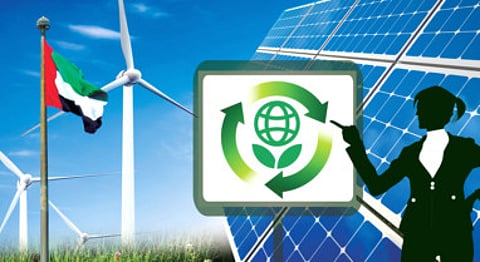Green jobs: A key to sustainable development
UAE is a pioneer in the field with both Abu Dhabi and Dubai adopting strategic plans for a greener tomorrow

The Arab world is currently facing numerous challenges and problems. Some are traditional such as security issues, water scarcity, rising unemployment and pollution. There are other emerging challenges such as increasing urbanisation, climate change impact and rising demand for energy.
For instance, all Arab countries suffer from the problems of rapid urbanisation, especially some countries that are almost 100 per cent urbanised such as Bahrain and Qatar. In addition, youth on an average constitute around 60 per cent of the population. This leads to huge demands for food, employment, housing, education, healthcare, transportation systems and other services.
When addressing these rising social, economic, and environmental challenges that are facing the Arab World, one can easily realise that these challenges are interlinked and must be addressed through an integrated approach. All these demands need to be managed in a sustainable way. Creating green and decent jobs in the Arab world is a key to sustainability and stability across the region. It was very obvious that recent turmoil and chaos over the past few years clearly linked to jobs in terms of availability and decency.
This is very crucial especially if we note that currently, the countries of the world are redefining and setting the universal sustainable development agenda for at least the next 15 years as the Sustainable Development Goals (SDGs) processes move rapidly towards their conclusion by the end of 2015. One of the proposed SDGs is “Promote sustained, inclusive and sustainable economic growth, full and productive employment and decent work for all” (Goal No 8) that, in simple words, means green jobs.
In general, the Arab countries are considered undiversified economies, i.e. capital intensive, with low employment rate and dependent on extractive industries (e.g., oil, natural gas, gold, iron, and phosphates), which makes them vulnerable to global price volatilities. Current economic development patterns will increasingly strain the ability of the Arab governments to cope with increasing demands for decent-paying jobs.
Achieving the aspired sustainable development rests almost entirely on getting the economy on the right path. It is very obvious that the present economic models have not adequately addressed social marginalisation and resource depletion, for instance.
The shift from brown to green economies can achieve sustainable development with a better quality of life, guarantee real investments, achieve social justice and, most importantly, create real green jobs.
Green jobs, also known as green collar jobs, are defined as “jobs that reduce the environmental impact of enterprises and economic sectors, ultimately to levels that are sustainable”. They are vital for the Arab world because it is clear that decent work, adequate wages, safe conditions, workers’ rights, social dialogue and protection can guarantee a satisfied workforce, less unrest, and more productivity and income. Green jobs provide good income generation opportunities and are seen as a real solution not only to environmental but also economic and social challenges.
In principle, green jobs can be found in all sectors in an economy and all sectors and jobs can potentially become greener. The jobs in many existing sectors such as agriculture and tourism in their work methods and profiles are greened. This shift will result in eliminating some current jobs which will no longer be needed. For instance, from a shift from fossil fuels to renewables, from truck manufacturing to railway rolling stock manufacturing, from land filling and waste incineration to recycling ... etc. Deployment of renewable energy (RE) in the Arab world especially can play a significant role in creating more green jobs.
It is worth mentioning that green jobs do not necessarily mean depending on modern clean technology only. In many cases cheap, sustainable, traditional local knowledge can be smarter and greener. Collective ancestral knowledge and traditional techniques of shading, lighting, building designs, irrigation and agriculture systems can be more effective, cheap, and provide more green jobs than the clean technology sector.
Investment in greener economic activities creates green jobs, directly (solar panel production, installation and maintenance) and indirectly (in the supply chain, steel production for wind turbines) and investment in environment-friendly industries leads to induced employment in the form of jobs generated by consumer spending.
It is worth mentioning that there are many initiatives across the region to shift towards a green economy and create green jobs. UAE is a pioneer in this field. For instance, both Abu Dhabi and Dubai have strategic plans. Abu Dhabi’s Vision 2030 sets key targets for the emirate’s development over the next 25 years, with a central focus on green low-carbon investment, green urban development and green transportation like Dubai Metro and electric cars. In addition, Masdar City is aiming to be one of the world’s most sustainable urban developments in the world.
There is huge potential to create more green jobs in the Arab world, more than is the case in many parts of the world because many brown sectors and industries can be greened in the region. Besides, green jobs will provide multiple benefits to the region by attracting green foreign investment and technologies, decreasing waste and emissions, encouraging resource efficiency and ultimately improving the quality of life and ensuring sustainable societies.
Dr Mohamed Abdel Raouf is an independent environment researcher.



